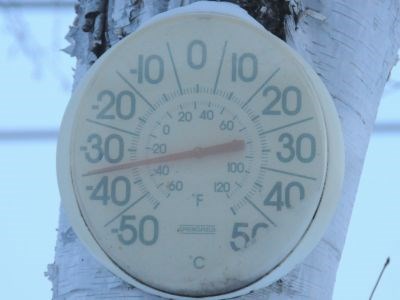Saying the weather was a bit nippy Jan. 23 is a vast understatement.
With the temperature sitting at -36.2 C between 6 and 8 a.m., and as low as -45 C with the windchill, a new record low has been set for the date.
Previously, the coldest Jan. 23 on record was in 1976, when it reached -35 C.
The frigid weather caused school buses to be cancelled throughout the region Jan. 23 and many to be late for work, as their vehicles wouldn't start without a boost.
Those brave enough to venture outside were bundled up from head to toe.
“There's an arctic air mass entrenched over eastern Canada,” which is causing very cold conditions, said Peter Kimbell, a warning preparedness meteorologist with Environment Canada.
This isn't the coldest temperature Sudbury has ever seen, though. That came Jan. 10, 1982, when the mercury dipped to -39.3 C.

A thermometer in Sudbury hovers around the -35 C point in the morning, although the weather on Jan. 23 set a new record, going as low as -36.2 C, and as low as -45 C with the windchill. Photo by Marg Seregelyi.
The cold is expected to last several more days, with the low for Thursday set to be -30 C, Friday -21 C, Saturday -17 C and Sunday -18 C. Monday's low will rise to a more moderate -9 C.
Environment Canada issued a windchill warning for the area, something it does only when windchill values are expected to be below -40 C.
“Temperatures of -30 to -35 C, combined with winds of 15 km/h will result in extreme windchill values of -40 to -50 C overnight and into Thursday morning,” a statement issued by Environment Canada said.
“Conditions will improve later Thursday as winds diminish and temperatures rise with daytime heating.
“Extreme caution is advised if outdoors. Frostbite and hypothermia can occur within minutes if adequate precautions are not taken.”
While we're currently in the midst of a cold spell, Kimbell said the mean temperature so far this month, -10 C, is above January's average mean of -13.6 C. That's because of the January thaw two weeks ago, when temperatures skyrocketed well above the freezing point.
“Of course, this cold weather is going to bring down this average,” Kimbell said.
“We're basically just compensating for the warm weather we've had. This is certainly well below normal, and bringing us closer to normal mean temperatures.”
When dealing with extremely cold temperatures, preparedness is key, he said. Those who are travelling should bring a well-stocked emergency kit, including blankets, in case of a vehicle breakdown.
“Obviously, dress appropriately, because it is extremely cold,” Kimbell said. “Frostbite is a significant concern.”
Korey Kennedy, a spokesperson for the CAA North and East Ontario, said the frigid weather kept the automobile association's roadside service hopping, with many people calling for a boost.
He said the CAA fielded in excess of 1,500 calls in the region Jan. 22, which is significantly more than usual.
Response times in the Sudbury area were slowed to 30 minutes for those in an emergency situation or stranded on the side of the road, two hours for those in a public place or up to 24 hours for those at home.
The CAA's average response time for all calls is normally less than 45 minutes, Kennedy said.
“Any time we tend to see a significant influx in calls like we've seen, there is a bit of a delay in responding to our members,” he said.
“With that being said, we're doing our utmost to ensure that we are providing them with unparalleled service by responding to them in a timely as well as professional manner.”
Kennedy encourages the public to mitigate the chances of having to phone the CAA by ensuring their battery is fully functional and plugging in their vehicle for a few hours before use.
